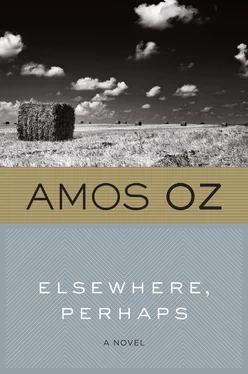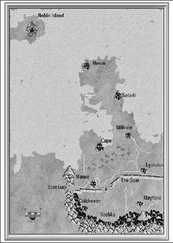Amos Oz - Elsewhere, Perhaps
Здесь есть возможность читать онлайн «Amos Oz - Elsewhere, Perhaps» весь текст электронной книги совершенно бесплатно (целиком полную версию без сокращений). В некоторых случаях можно слушать аудио, скачать через торрент в формате fb2 и присутствует краткое содержание. Год выпуска: 1985, Издательство: Mariner Books, Жанр: Современная проза, на английском языке. Описание произведения, (предисловие) а так же отзывы посетителей доступны на портале библиотеки ЛибКат.
- Название:Elsewhere, Perhaps
- Автор:
- Издательство:Mariner Books
- Жанр:
- Год:1985
- ISBN:нет данных
- Рейтинг книги:4 / 5. Голосов: 1
-
Избранное:Добавить в избранное
- Отзывы:
-
Ваша оценка:
- 80
- 1
- 2
- 3
- 4
- 5
Elsewhere, Perhaps: краткое содержание, описание и аннотация
Предлагаем к чтению аннотацию, описание, краткое содержание или предисловие (зависит от того, что написал сам автор книги «Elsewhere, Perhaps»). Если вы не нашли необходимую информацию о книге — напишите в комментариях, мы постараемся отыскать её.
Elsewhere, Perhaps — читать онлайн бесплатно полную книгу (весь текст) целиком
Ниже представлен текст книги, разбитый по страницам. Система сохранения места последней прочитанной страницы, позволяет с удобством читать онлайн бесплатно книгу «Elsewhere, Perhaps», без необходимости каждый раз заново искать на чём Вы остановились. Поставьте закладку, и сможете в любой момент перейти на страницу, на которой закончили чтение.
Интервал:
Закладка:
The man betrayed no sign of haste. He stood as if rooted to the spot, inspecting his surroundings. Men and women passed close by him, on the path that circles the dining hall, and cast him curious but friendly glances. The newcomer returned their looks and even nodded politely, but he did not address anyone. Eventually, he caught sight of a green bench half-hidden in the shrubs at the edge of the lawn. He picked up his suitcase and walked over to it. His step was light and bouncy. Evidently the case was not heavy. He sat quite still, smoking with an aborbed look, as if trying to extract every particle of taste from each mouthful of smoke. Once or twice the thumb of his left hand, which was holding the cigarette, rose to scratch his eyebrows, an intriguing gesture that conveyed no hint of embarrassment but only absent-mindedness or else concentration — and a certain anxiety, since for an instant the burning tip of the cigarette almost touched his black hair.
The stranger's face was full of folds and wrinkles, as if he had too much skin, so that instead of being stretched over the bones of his skull it hung from them in limp abandon. On his upper lip there was a tiny, shapeless mustache, around which a curious movement could be detected, as if his nose and its surrounds were forever twitching with some mysterious life.
Finally, he pinched the stub of his cigarette until the remaining tobacco spilled out; he stood up, picked up his case, and walked across to the door of the dining hall. He walked with a slight stoop, like a man walking into a strong head wind.
It seems that it was Podolski, the co-ordinator of the work rota, who greeted the stranger and asked if he could help him. The latter replied in well-phrased, musical Hebrew and in a somewhat hoarse bass voice, and inquired where he might Find Comrade Berger. Podolski asked whether he was referring to Ezra Berger or to his son Tomer. The stranger smiled, in such a way to arouse distinctly uneasy feelings in the other. He was looking for Comrade Ezra Berger, the father. Podolski shook his head and replied:
"Ezra? He's out on a trip. He leaves at six in the morning. But Tomer is in the dining hall. I'll call him."
The stranger apologized for any inconvenience he was causing, but said that he would prefer, if it was not too much trouble, to see Comrade Bronka Berger first.
Podolski suggested that he go into the dining hall and have something to eat and drink, and meanwhile he, Podolski, would go and look for Bronka. The stranger replied that he was impressed by the hospitality for which kibbutzim were famous, but that he preferred to wait over on the bench. There was no need to hurry. He was not a busy man. He had plenty of time. There was something he would like to know, he added, adjusting his purple tie as he spoke, even though it was not out of place, he would like to know, well… how to put it… whether… whether there was any news in the Berger family. He knew, of course, about the arrival of dear little Danny, but… what he wanted to know was… how matters stood generally in the family, because, er… he was himself a member of the family and… he would like to know the facts before he met Bronka. Naturally, his interlocutor was not obliged to answer.
Podolski reflected for a moment, then said:
"It seems they still have problems. If you'll excuse me, I'll go and tell Bronka you've arrived."
Ten minutes later Bronka appeared, wearing working trousers and a white apron. Zechariah embraced his sister-in-law and kissed her very properly on both cheeks. Bronka, her wrinkled face all smiles, asked when he had arrived in Israel and when he had got to Metsudat Ram and which way he had come and whether he found the heat oppressive and why he hadn't sent a telegram to say he was coming and what his plans were and how he was. Above all, what a pity, what a terrible pity it was that Ezra hadn't known that it was today that. As she spoke she seized his suitcase and began to lead the way. Here am I wearing you out with my chatter, and you must be tired out from the journey, and hungry and thirsty besides.
Zechariah took the suitcase from Bronka and placed his hands firmly on her hips.
"Excuse me a moment," he said. "There are some more cases in the taxi. I must pay the driver and dismiss him. There are some presents for all the family, too."
It turned out that Zechariah had arrived at dawn on an SAS plane and had already been in touch with various people in Tel Aviv by telephone. He had intended to spend a day or two first in Tel Aviv to deal with some urgent business matters. But while he was passing through customs he had been overcome by such strong feelings of nostalgia that he had thrown everything to the winds and hurried straight here, to his beloved family. What is more important than one's family, my dear Bronka? Nothing in the whole wide world. So here I am, bursting to proclaim, "I am your brother Joseph." You must excuse this emotional outburst, Bronka, but that's the way with emotion; it carries one away, ha ha, yes, that's the way with emotion.
When they were inside the shuttered room Zechariah hastened to unwrap some of his packages. Before he would touch the glass of fruit juice that Bronka offered him, he insisted on showing her the presents.
"Look at this material, Bronka. Feel it. Isn't it magnificent? Yes, Bronka, it's for you. You can make it up into a beautiful dress. Lovely cloth for a lovely lady. In this case is a tape recorder for the young couple, and there's a complete woolen outfit here for dear little Danny — how I long to hold him and kiss him and cry over him; the electric shaver is for my own beloved brother Ezra, and I haven't forgotten our dear Oren, either — he's sure to like this model railway. Look, Bronka, it works on its own electrical circuit, and it's just like the great railway system of Europe. No, I haven't forgotten about the principles. I'm a man of principle and I respect the principles of others, including the collectivist ideology of the kibbutz. Of course, of course. But all the same, can't I give some small, purely token gift to the people I love? Please, Bronka, let's hear no more about it. Not a word. If you don't want my presents, that's a sign you don't want me, either. I'll leave right away. Surely you don't want to offend your dear brother? That's enough, Bronka. I've already heard all your arguments. You're not saying anything new. Look, Bronka, look, look at this tape recorder: it's the latest model, three tracks, four speeds, extrasensitive microphone; you can record the most complicated music. God rot those filthy Germans in hell — but there's nothing wrong with their industry. This is the most famous make in the world. Oh, Bronka, my dear, they make marvelous machinery!"
While Zechariah poured out his persuasive arguments without letting his sister-in-law get a word in edgeways, his thin, hairy fingers ran over the objects taken out of their packing cases and boxes. His movements were as skillful and dexterous as those of a traveling salesman, and his voice held the insistent tone with which traveling salesmen hector their stunned victims into buying.
Bronka poured him a glass of ice-cold juice. Zechariah pursed his lips and sipped it delicately. His eyes filled with forced joy. He wiped his lips with his green handkerchief and replaced it instantly in his pocket with the skill of a prestidigitator.
"It's cold," he said, "and refreshing for the weary soul."
Bronka asked if he would like a shower. Zechariah refused with a spate of polite phrases. Not at all, not at all, he must be disturbing her terribly, she had her work to do, she could leave him and get on with it, he wouldn't steal or break anything, she could trust him.
Bronka burst out laughing.
"No, I don't have to go back to work. We'll go to the nursery to see Danny, and on the way I'll look in and say I shan't be doing any more work this morning. We don't have a visitor like you every day, after all. It's so many years since we last met. Yes. You came in '48 as a refugee, and you left us after a year. Still, let's not talk about the past now. Ezra will be sorry, of course, that he wasn't here to greet you. But it's not his fault. It's your fault, because you decided to surprise us. You're the guilty party, Zechariah."
Читать дальшеИнтервал:
Закладка:
Похожие книги на «Elsewhere, Perhaps»
Представляем Вашему вниманию похожие книги на «Elsewhere, Perhaps» списком для выбора. Мы отобрали схожую по названию и смыслу литературу в надежде предоставить читателям больше вариантов отыскать новые, интересные, ещё непрочитанные произведения.
Обсуждение, отзывы о книге «Elsewhere, Perhaps» и просто собственные мнения читателей. Оставьте ваши комментарии, напишите, что Вы думаете о произведении, его смысле или главных героях. Укажите что конкретно понравилось, а что нет, и почему Вы так считаете.












